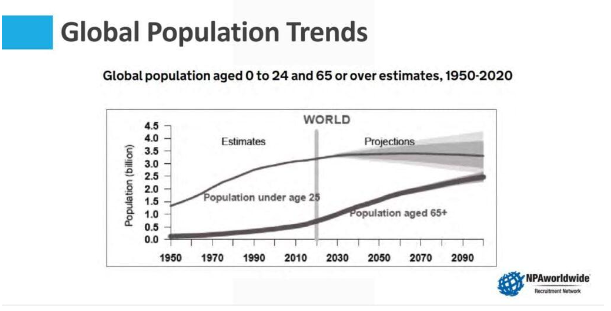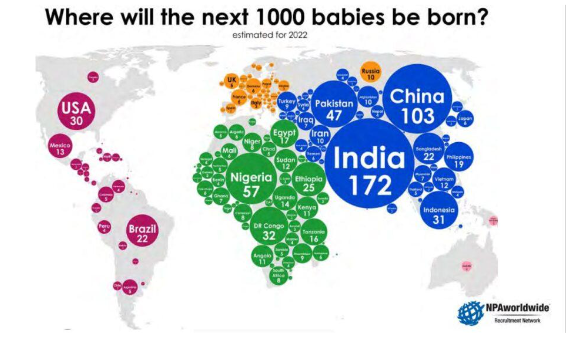The Demographic Drought – The Disaster Continues

Insights from NPA Worldwide Conference 2023
Recently, Norwest Recruitment’s Director, Erica Westbury, attended the NPA conference in Sicily to discuss the global outlook in recruitment over the next few years. Interestingly, one of the key i nsights presented by Dave Nerz, President of NPA Worldwide is “The Demographic Drought,” something that we are seeing not only here in Western Sydney but across Australia and the globe.
Traditionally, businesses would hire skilled staff to grow as well as natural population growth. However, with the continued skills shortage we have seen, even prior to the pandemic, the same question keeps being asked: “Why is there a skills drought? Where is everyone?”
The US and the UK are reporting a drop in workforce participation, with “the US experiencing its lowest levels of workplace participation since the mid-1970s before the influx of women into the workforce,” says Nerz. How could this be?
What is causing these shortages?
Thousands of the Baby Boomer generation are retiring every day, and this was further pushed by the pandemic. Not only will their workplace participation cause a problem but so will their wealth. “We’re seeing this issue here in Western Sydney,” says Erica Westbury. “The children and grandchildren of the Baby Boomer generation are relying on the generosity of their parents as well as their potential inheritance. They are staying at home longer, and the expectation of purchasing a home is not the same as it used to be because home prices have increased so much. We’re seeing more people choosing a lifestyle over work, with many able to demand the hours they want to work or being selective over the salary on offer. Social media has opened up a global marketplace and many young people are supporting themselves with their side hustles.”

Additionally, birth rates across the globe are declining due to reasons such as industrialisation, urbanisation, secularisation, people marrying later in life and choosing to have fewer children, as well as women prioritising education and career over having many or any children. Debt, unemployment and economic uncertainty are also contributing factors.
What does this mean?
The projections of death versus birth rates mean countries need to look at other avenues to increase their population. James Robards from the Population and Household Projections Office for National Statistics (USA) states, “Net international migration is expected to play an increasing role in population growth.” The USA’s demographic decline is 15 years behind Japan. Australia is also relying on immigration to fill our vacancies…however, this is a global expectation. We’re all fighting for the same talent!

Korn Ferry predicts that by 2030, 85 million jobs around the world will go unfilled because there aren’t enough skilled workers. Therefore, growing those skills from within amounts to self-preservation for companies.
“We’re all going to be fighting for the same talent across the globe,” says Erica. “We’re not seeing the full impacts of what is happening overseas here just yet but we are definitely starting to feel it. This is the time that businesses can prepare themselves by looking at the way they are recruiting, who they are placing into their organisations, and how they will retain their staff.”
The rise of automation was also discussed in the forum; however, AI is expected to actually increase jobs more than remove them. The World Economic Forum estimates that AI and robotics advancements will result in a net increase of 12 million jobs globally by 2025.
What happens next?
The skilled labour shortage will be a long-term issue; however, here in Western Sydney, we have some time to make changes and prepare for the future. The businesses that prepare themselves now will have the opportunity to attract the best employees and retain them for the long term, minimising their impact on productivity.
“Businesses here in Western Sydney already have the advantage of a large talent pool of people wanting to work closer to home, which is one of the key factors we come across when speaking to our job seekers. They’re also still able to have a competitive salary package even while working close to home,” says Erica. “However, there are other defining factors that we repeatedly hear from our job seekers, such as flexible hours and/or career development. This is something that some of our clients are already offering, but more businesses can consider including as a means to attract skilled talent. Another area that we see as a defining factor is job training and onboarding of new staff. The first impression does matter. So when you have new talent starting, have a structured program for them to settle into, have other staff and management welcome them, have their laptop or computer ready for them so they know they were expected, and their team is excited to have them there. Long term mentoring and an upskilling program might save your business in the next 5 years. Relationships with recruiters in your niche will help by having eyes in your industry 24/7. The conversations we’re having with our clients now are very different to what it was a couple of years ago.”
If you would like to find out more about the trajectory of the skills shortage or the issues discussed at the NPA conference, or if you want to know how we can help your business stay competitive in the market, please reach out to Erica Westbury and the team at Norwest Recruitment on 8853 4111 or email recruit@norwestrecruitment.com.au.












